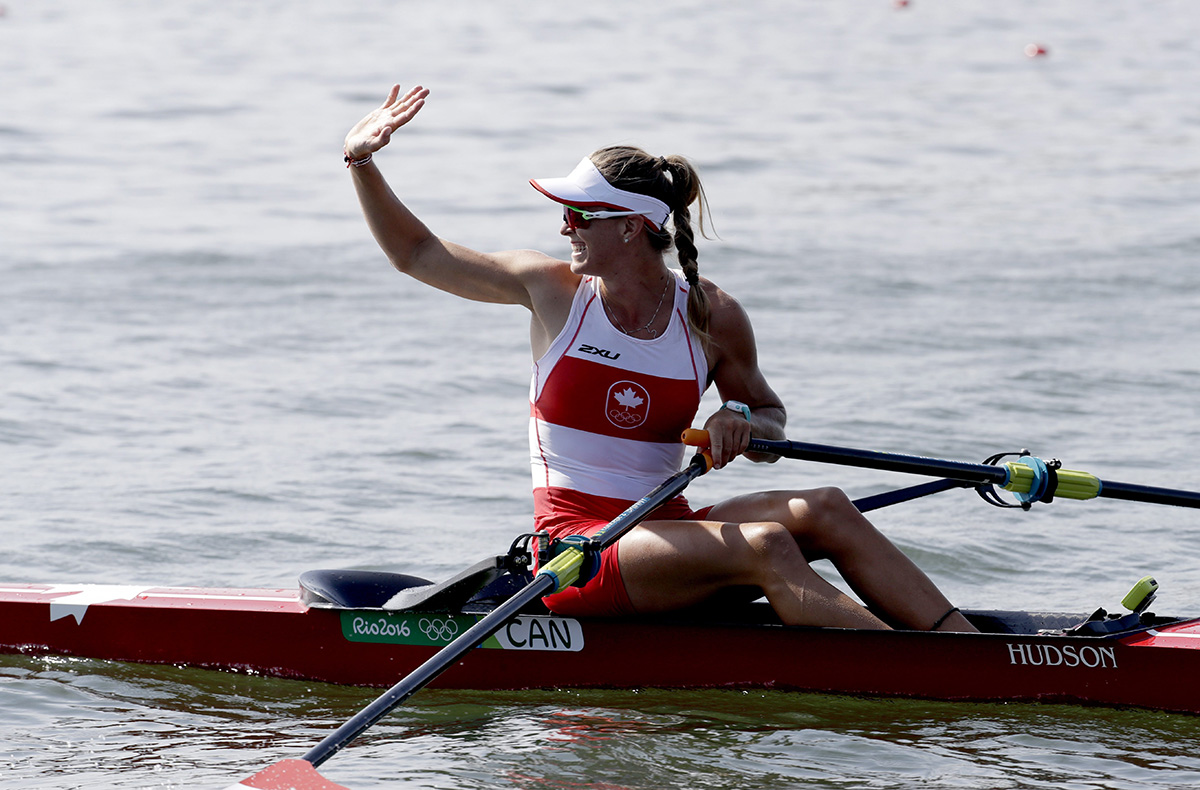RIO DE JANEIRO – Whitecapped waves splashed over boats, one Canadian took on “quite a bit” of water and another lost the grip of his oar, costing his crew dearly on a chaotic opening day at the Olympic rowing regatta.

Two unfortunate Serbians even capsized as competitors battled high winds and choppy conditions at the picturesque Lagoa Stadium in the heart of Rio.
The athletes fought hard just to stay on course in the polluted water that was roundly criticized ahead of the Games, looking at times like they were rowing through quicksand.
READ MORE: Rio 2016: How do athletes hurt themselves? A look sport-by-sport
“I appreciate it’s probably exciting TV, but for us in the sport this is about as challenging as it gets,” said Canadian men’s head coach Martin McElroy. “If this wasn’t the Olympics you might actually find that the races were being postponed or delayed in order to make sure the conditions were fair.”
World rowing federation executive director Matt Smith said the decision to keep going was made because weather forecasts show “it’s going to be even worse” in the coming days.
Canada’s Carling Zeeman battled the choppy course to win her heat and advance to the quarter-finals of the women’s single sculls, but the men’s lightweight four and the men’s quadruple sculls finished last in their races and will have to battle back via the repechage to advance.
- What is a halal mortgage? How interest-free home financing works in Canada
- Ontario doctors offer solutions to help address shortage of family physicians
- Capital gains changes are ‘really fair,’ Freeland says, as doctors cry foul
- LGBTQ2 rallies will be held across Canada next month. Here’s what to know
READ MORE: Rio 2016: Brazil’s poor watch the spectacle from the slums
“It was pretty rough,” said Zeeman. “The key for me was to just stay calm and stay cool and keep going, don’t ever take an off-stroke or give up.”
The 25-year-old from Cambridge, Ont., crossed the finish line in her Olympic debut with a time of eight minutes 41.12 seconds – and a lot of water on board from the crashing waves.
“In the warm-up zone you get a sense of what the race is going to be like,” said Zeeman, who will race in Tuesday’s quarters. “I knew it would be a totally different sort of race because it was such a strong wind. From the start line I knew I had about 200 metres of calm water before the show started. Going into the race, that was the plan – start hard and settle into a rhythm that I would be able to sustain for 2,000 metres.”
Serbian men’s pair Milos Vasic and Nenad Benik weren’t as fortunate after getting dumped into Lagoa Rodrigo de Freitas by the swells.
“If I could give an educational likeness, it’s probably like walking down some stairs and when you’re mid-stride the step gets three times the height,” said New Zealand’s Hamish Bond. “You go to take a step and you’re taking three steps all at once. Or maybe skiing with a blindfold on.”
READ MORE: Rio 2016 swimming: Penny Oleksiak advances to butterfly semis
While Zeeman started brightly for Canada, the rest of the day didn’t go as planned at the breathtaking venue the includes the famous Christ the Redeemer statue towering overhead.
Brendan Hodge of South Delta, B.C., Maxwell Lattimer of Delta, B.C., Nicolas Pratt of Kingston, Ont., and Eric Woelfl of St. Catharines, Ont., will need to race in Sunday’s repechage in the lightweight men’s four after finishing fourth in their heat and missing a chance to book a spot in the semifinals.
And things got even worse when the men’s quad of Julien Bahain – who was born in France but now competes for Canada – Will Dean of Kelowna, B.C., Kingston’s Rob Gibson and Pascal Lussier of St-Jean-sur-Richelieu, Que., finished last in their heat.
The crew was in decent shape through 1,500 metres until disaster struck when a wave caused Gibson to lose the grip on his oar, forcing the Canadians to pause their strokes to get back on track.
Bahain, Dean, Gibson and Lussier, who all declined to speak to the media afterwards, will need a top-2 finish in Monday’s repechage to make the final.
“I thought the guys had rowed a pretty good race. They kept clean in the worst of that water and they were actually just starting to make a move, gather a little bit of pace to be in a good position,” said McElroy. “We know that they’ve got really good finishing speed. The quad is a technically complex event. The conditions have been pretty rough and unfortunately one of the handles got away from one of the guys. Then you’re in trouble.”
READ MORE: Rio 2016: Canada falls 2-0 to top seed Brazil in preliminary beach volleyball
The quad required a last-chance qualifier just to make it to Rio and is one of two crews, along with the men’s four, created in the wake of Rowing Canada’s decision to scrap the popular and successful eights boat after the London Olympics.
Canada’s men’s eight won silver in 2012 after capturing gold 2008, 1992 and 1984, but the thinking was the team could double its medal haul and subsequent funding from the government-backed Own The Podium program with two cracks at hardware.
The quad will have one shot at keeping that plan on course.
“These guys have had to pick themselves up before,” said McElroy. “There’s a deep mental strength within these guys. We have confidence in the guys that they’re going to be able to turn this around.”




Comments